I am old enough to remember a television variety show hosted by Ed Sullivan, who typically announced, “We’ve got a really big shew tonight!” Many of his shows were really big — The Beatles appeared on Ed Sullivan’s show February 9, 1964.
Prior to becoming a television show host, Ed Sullivan was a reporter and syndicated columnist for The New York Daily News and The Chicago Tribune. And in 1938 he wrote a lovely article about Basil Rathbone, which I share with you here.
Cad No Longer, Rathbone Gets Sympathetic Role
by Ed SullivanBasil Rathbone, as a result of his intelligent, purposeful, and talented portrayal in “If I Were King,” has won a pardon from the rogues’ gallery of Hollywood. Hollywood’s rogues’ gallery is that sinister collection of villains and menaces who go from one reel to another spreading ruin and chaos, upsetting the marriage plans of heroine and hero and in general behaving caddishly. Mr. Rathbone has been a rogue ever since he came west of the Rockies to emote for the cinema. In his first picture they cast him as a villain, and he showed such an aptitude for it that he became typed as a villain. Whenever dirty work was to be done at the crossroads they’d send for Rathbone.
In “Tale of Two Cities” they needed a scoundrel to ride down some children with his carriage. Rathbone got the job. the plot called for a cur to whip the daylights out of Freddie Bartholomew. They sent for Rathbone. There was nothing despicable or mean that he wouldn’t do, and did.
“It was all in a day’s work,” Basil told me in a cultured Oxford accent. “I didn’t realize that people were talking it seriously until my wife and I went east for a trip. As we prepared to board the train the porter on the Chief took one look at me and turned pale. We went into the dining car to have dinner, and the waiter stared at me as though he had seen Old Nick himself. Then, and only then, did I realize that movie fans actually believed I was just as unprincipled and mean as I appeared to be on the screen.
“In one picture they had seen me make friends with an old lady and murder her. I chased Greta Garbo out of my house, and I have forced my unwelcome attentions on Claudette Colbert, Sigrid Gurie, Loretta Young, Olivia De Havilland, and other nice young ladies. I have threatened to throw Gary Cooper to the lions and showed him chained vultures that would pick his eyes out, the lions failing. In ‘Tovarich’ Claudette Colbert said that I had pressed a lighted cigaret against her skin. The movie fans, so compelling and persuasive is the camera, not only saw those things but believed them.”
For the last seven months, ever since his trip to New York, Rathbone has been begging the studios to give him more sympathetic roles. He finally got what he wanted in “If I Were King,” and from now on, he hopes, Hollywood will forget his villainies.
There is no doubt about it—you believe what you see on the screen if it is repeated often enough. When I went to Rathbone’s home to do this interview I half expected to see Rathbone in slinky garments and a turban, sitting on the floor of the living room, sneering into a crystal ball. I was prepared to trade sneer for sneer, leer for leer—such is the power of the movies.
I felt a trifle ashamed of myself when Rathbone, much shorter than he appears on celluloid, came bounding into the room with a shirt opened at the collar. “Dear old boy,” he said “what will you have to drink? What did you think of the Notre Dame game? Have you been following that amazing Goldberg at Pittsburgh?”
Offstage Rathbone is an enthusiastic sporting fan, and he prefers horse racing to all other sports, though he follows them all. It takes you a few minutes to acclimate yourself to the dastard of “Robin Hood” discussing horse racing and college football, but once that has worn off, you find yourself enjoying the experience, because he is very enthusiastic and very charming.
“It is the ‘typing’ process of pictures that is its greatest evil,” Rathbone tells you. “There is no greater handicap to an actor’s progress. On the stage you play one type of role in one show, a completely different type role in the next. That makes for progress. An actor can learn something about his business. Hollywood believes, however, that a leading man must always be a leading man, that a villain must ever be a bounder. As a result all the fun of acting is removed from it, because variety is the spice of life.”
Rathbone is one of the few “heavies” of the screen who have escaped from the rogues’ gallery. Others have tried, but to no avail. To less competent performers than Rathbone the assignment to villainous roles is fortunate. It is Hollywood history that no villain ever has flopped. The role of a scoundrel or a killer is foolproof. Actors of moderate talent have become stars overnight when cast as scurrilous rascals.
However, Basil needed no such aid, because he was a fine stage performer before Hollywood signed him. “The Swan,” “The Grand Duchess and the Waiter,” “The Importance of Being Earnest,” “Julius Caesar,” “The Devil Passes,” and “Romeo and Juliet” were a few stage hits which had demonstrated his fine talent. There was no role in which couldn’t have cast him with excellent results. Unfortunately for him, his first role was that of a villain, and he’s been trying to live it down ever since. He’s finally made the grade.

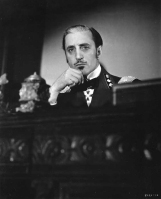
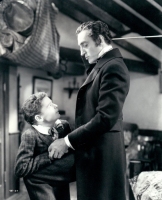
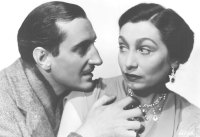
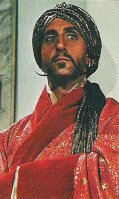
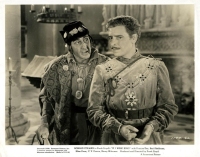
IN MEMORY OF (Basil’s super-special pal) VINCENT PRICE
________________________
May 27, 1911–October 25, 1993
———————————————
24 years after your passing, you are still (& will ALWAYS be) loved + missed….
Halloween time is a bittersweet reminder of your wonderful life, and sorrowful death. 😦
LikeLike
I thought he was terrific in every part he played-a truly gifted performer.
LikeLiked by 2 people
How I wish Basil had managed to truly break free of type casting! Thanks for a great article!
LikeLiked by 1 person
A delightful article. We do tend to forget Ed Sullivan was a journalist. And Rathbone was perfectly correct that typecasting was a really destructive force in Hollywood — it held a lot of good actors back.
LikeLiked by 1 person